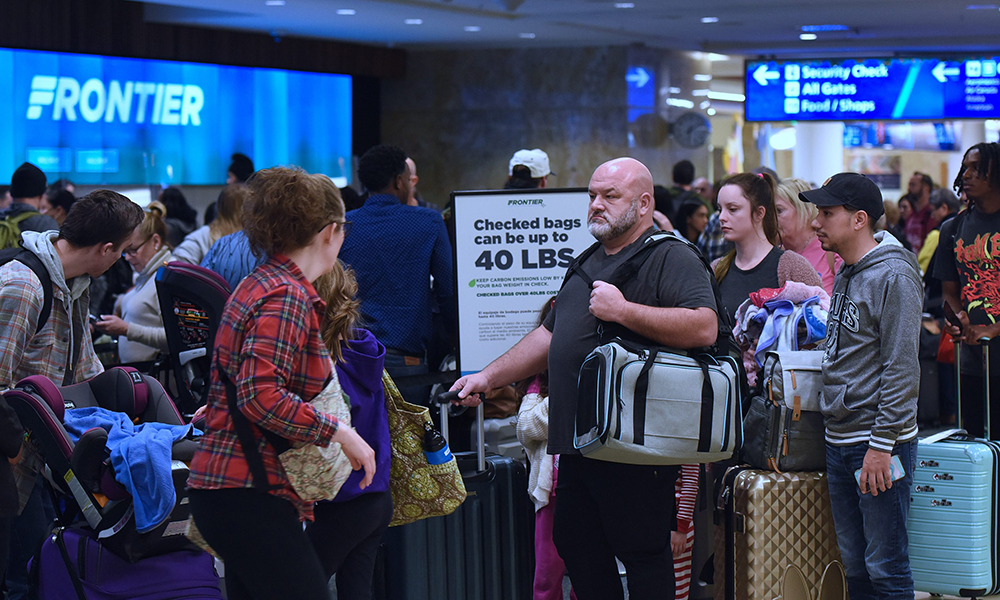
邊疆航空公司(Frontier Airlines),,以其低廉的票價和包括攜帶背包與購買機(jī)上飲料在內(nèi)的多樣化附加服務(wù)而聞名,正在爭奪富裕旅客,。該公司周二宣布,,將在其飛機(jī)上增設(shè)頭等艙座位,這也是低成本航空公司提供高端航班選項的大趨勢的一部分,。
為了配備全新的頭等艙座位,,邊疆航空公司計劃移除當(dāng)前機(jī)隊前排三乘三布局的經(jīng)濟(jì)艙座位,并在飛機(jī)前部區(qū)域改裝為二乘二布局的寬敞座椅,。該公司預(yù)計將于2025年底開始提供這類新座椅,。
除了引入新座位布局,邊疆航空公司還將重新調(diào)整其忠誠度計劃,,允許乘客使用里程來抵扣行李費用或享受座位升級服務(wù),。此外,該公司還計劃為黃金級及以上會員提供座位免費升級服務(wù),,同時為白金級和鉆石級會員免費提供同行票,。
邊疆航空首席執(zhí)行官巴里·比弗(Barry Biffle)在一份新聞稿中表示:“我們聽取了客戶的意見,他們期望能有更多的高端選擇,,比如頭等艙座位,、可兌換的座位升級服務(wù)、為同行者提供的免費旅行機(jī)會,以及使用里程兌換機(jī)票以外服務(wù)的能力,?!?/p>
今年早些時候,該航空公司宣布對其定價體系進(jìn)行重大調(diào)整,,然后推出了四種不同的預(yù)訂選項——從最便宜的基本機(jī)票到更昂貴的商務(wù)機(jī)票——并取消了其中三項選擇的退改簽費用,。
其他廉價航空公司也實施了類似的變革,旨在吸引那些愿意為旅行體驗買單的“報復(fù)性消費”旅客,。例如,,精神航空公司(Spirit Airlines)為在歐洲境內(nèi)旅行的乘客提供了無中間座位的選項,而西南航空公司(Southwest Airlines)則增加了座位的腿部空間,,并摒棄了其混亂的“自選座位”模式,。
西南航空公司首席執(zhí)行官羅伯特·喬丹(Robert Jordan)上個月告訴美聯(lián)社:疫情爆發(fā)后,“人們顯然更傾向于選擇高端的飛行體驗,。高端是自我界定的——無論是額外的腿部空間,,還是飛往歐洲的頭等艙——但無論具體形式如何,人們對高端服務(wù)的需求在上升",。
比弗預(yù)計,,邊疆航空最新的高端化策略將在2026年帶來2.5億美元收入,并且到2028年這一數(shù)字有望超過5億美元,。
廉價座位上的風(fēng)景
廉價航空公司之所以試圖吸引更富裕的旅客,,歸根結(jié)底是為了擺脫虧損的財務(wù)困境。盡管2024年美國航空業(yè)的客運量創(chuàng)下歷史新高,,但低成本航空公司的收益并不可觀,。以美國客運量排名第七的精神航空公司為例,該公司于11月根據(jù)美國破產(chǎn)法典第十一章申請破產(chǎn)保護(hù),,原因是燃油價格和勞動力成本上漲,,侵蝕了整個行業(yè)的利潤率。雖然這可能意味著邊疆航空公司少了一個競爭對手,,但邊疆航空自身的業(yè)績也不理想,,10月的收入為9.35億美元,凈利潤僅為2600萬美元,。
更重要的是,,達(dá)美航空(Delta)和美國航空(American Airlines)等傳統(tǒng)大型航空公司一直在蠶食低成本航空公司的市場,原因是它們能夠為富裕旅客提供更多增值服務(wù):例如,,達(dá)美航空將從本月開始為頭等艙乘客提供Shake Shack漢堡,。為了利用最后一分鐘才決定出行的旅客和尋求報復(fù)性消費的旅客,航空公司還增加了飛往熱門旅游目的地的航班,,但運力增加意味著有更多的空座位需要填補(bǔ),,因此航空公司降低票價以吸引乘客填補(bǔ)這些座位。
廉價航空公司效仿這一策略,將優(yōu)質(zhì)設(shè)施和折扣票價相結(jié)合,,最終往往意味著顧客要支付更高的票價(從長遠(yuǎn)來看),,這可能會削弱廉價航空公司“低成本”的聲譽(yù)。對于無法承受更多損失的廉價航空公司來說,,這是值得冒的風(fēng)險,。
達(dá)美航空首席執(zhí)行官埃德·巴斯蒂安(Ed Bastian)在7月的財報電話會議上說:"如果你處于航空業(yè)食物鏈的底層,就無法承受持續(xù)虧損,,尤其是考慮到過去幾年我們所見證的需求狀況,。”(財富中文網(wǎng))
譯者:中慧言-王芳
邊疆航空公司(Frontier Airlines),,以其低廉的票價和包括攜帶背包與購買機(jī)上飲料在內(nèi)的多樣化附加服務(wù)而聞名,,正在爭奪富裕旅客。該公司周二宣布,,將在其飛機(jī)上增設(shè)頭等艙座位,,這也是低成本航空公司提供高端航班選項的大趨勢的一部分。
為了配備全新的頭等艙座位,,邊疆航空公司計劃移除當(dāng)前機(jī)隊前排三乘三布局的經(jīng)濟(jì)艙座位,,并在飛機(jī)前部區(qū)域改裝為二乘二布局的寬敞座椅。該公司預(yù)計將于2025年底開始提供這類新座椅,。
除了引入新座位布局,,邊疆航空公司還將重新調(diào)整其忠誠度計劃,允許乘客使用里程來抵扣行李費用或享受座位升級服務(wù),。此外,,該公司還計劃為黃金級及以上會員提供座位免費升級服務(wù),同時為白金級和鉆石級會員免費提供同行票,。
邊疆航空首席執(zhí)行官巴里·比弗(Barry Biffle)在一份新聞稿中表示:“我們聽取了客戶的意見,他們期望能有更多的高端選擇,,比如頭等艙座位,、可兌換的座位升級服務(wù)、為同行者提供的免費旅行機(jī)會,,以及使用里程兌換機(jī)票以外服務(wù)的能力,。”
今年早些時候,,該航空公司宣布對其定價體系進(jìn)行重大調(diào)整,,然后推出了四種不同的預(yù)訂選項——從最便宜的基本機(jī)票到更昂貴的商務(wù)機(jī)票——并取消了其中三項選擇的退改簽費用。
其他廉價航空公司也實施了類似的變革,,旨在吸引那些愿意為旅行體驗買單的“報復(fù)性消費”旅客,。例如,精神航空公司(Spirit Airlines)為在歐洲境內(nèi)旅行的乘客提供了無中間座位的選項,而西南航空公司(Southwest Airlines)則增加了座位的腿部空間,,并摒棄了其混亂的“自選座位”模式,。
西南航空公司首席執(zhí)行官羅伯特·喬丹(Robert Jordan)上個月告訴美聯(lián)社:疫情爆發(fā)后,“人們顯然更傾向于選擇高端的飛行體驗,。高端是自我界定的——無論是額外的腿部空間,,還是飛往歐洲的頭等艙——但無論具體形式如何,人們對高端服務(wù)的需求在上升",。
比弗預(yù)計,,邊疆航空最新的高端化策略將在2026年帶來2.5億美元收入,并且到2028年這一數(shù)字有望超過5億美元,。
廉價座位上的風(fēng)景
廉價航空公司之所以試圖吸引更富裕的旅客,,歸根結(jié)底是為了擺脫虧損的財務(wù)困境。盡管2024年美國航空業(yè)的客運量創(chuàng)下歷史新高,,但低成本航空公司的收益并不可觀,。以美國客運量排名第七的精神航空公司為例,該公司于11月根據(jù)美國破產(chǎn)法典第十一章申請破產(chǎn)保護(hù),,原因是燃油價格和勞動力成本上漲,,侵蝕了整個行業(yè)的利潤率。雖然這可能意味著邊疆航空公司少了一個競爭對手,,但邊疆航空自身的業(yè)績也不理想,,10月的收入為9.35億美元,凈利潤僅為2600萬美元,。
更重要的是,,達(dá)美航空(Delta)和美國航空(American Airlines)等傳統(tǒng)大型航空公司一直在蠶食低成本航空公司的市場,原因是它們能夠為富裕旅客提供更多增值服務(wù):例如,,達(dá)美航空將從本月開始為頭等艙乘客提供Shake Shack漢堡,。為了利用最后一分鐘才決定出行的旅客和尋求報復(fù)性消費的旅客,航空公司還增加了飛往熱門旅游目的地的航班,,但運力增加意味著有更多的空座位需要填補(bǔ),,因此航空公司降低票價以吸引乘客填補(bǔ)這些座位。
廉價航空公司效仿這一策略,,將優(yōu)質(zhì)設(shè)施和折扣票價相結(jié)合,,最終往往意味著顧客要支付更高的票價(從長遠(yuǎn)來看),這可能會削弱廉價航空公司“低成本”的聲譽(yù),。對于無法承受更多損失的廉價航空公司來說,,這是值得冒的風(fēng)險。
達(dá)美航空首席執(zhí)行官埃德·巴斯蒂安(Ed Bastian)在7月的財報電話會議上說:"如果你處于航空業(yè)食物鏈的底層,,就無法承受持續(xù)虧損,,尤其是考慮到過去幾年我們所見證的需求狀況,。”(財富中文網(wǎng))
譯者:中慧言-王芳
Frontier Airlines, known for its cheap fares and fees for everything from bringing a backpack to buying an in-flight drink, is making a bid for wealthy travelers’ wallets. The discount airline will introduce first-class seating on its planes, the company announced Tuesday, part of a greater trend of low-cost carriers premiumizing flight options.
In order to install the new first-class seats, Frontier will scrap the first two rows of three-by-three economy seats in its current fleet and retrofit the larger chairs in two-by-two rows at the front of the aircrafts. The airline will begin offering the seats in late 2025.
Along with new seating, Frontier will rework its loyalty program so customers will be able to trade in miles for waived baggage fees and seating upgrades. It will also dole out free seat upgrades to gold-tier members and above, and free companion tickets to platinum- and diamond-level members.
“We’ve listened to customers, and they want more—more premium options, like first class seating, attainable seat upgrades, more free travel for their companions, and the ability to use miles on more than just airfare,” Frontier CEO Barry Biffle said in a press release.
The changes come on the heels of an overhaul of its pricing structure announced earlier this year, in which the airline introduced four different booking options—from the cheapest basic to more expensive business—and ditched change and cancellation fees for three of those options.
Other discount airlines have made similar changes to appeal to revenge-spending passengers willing to shell out on travel, such as Spirit Airlines blocking out the middle seat for customers travelling within Europe, and Southwest Airlines expanding leg room and doing away with its chaotic choose-your-own-seat model.
After the pandemic, “there is a clear preference for more premium,” Southwest CEO Robert Jordan told the Associated Press last month. “Premium is kind of self-defined—whether that is extra legroom, first-class to Europe, whatever it is—but there is a rise in the desire for premium, something a little better.”
Biffle expects Frontier’s latest premiumization to bring in $250 million revenue in 2026 and more than $500 million in 2028.
The view from the cheap seats
Low-cost carriers’ appeal to wealthier travelers is ultimately a bid to rescue themselves from a financial model that has hemorrhaged money. Despite U.S. airlines seeing record travel in 2024, discount carriers haven’t seen strong returns. Spirit Airlines, the U.S.’s seventh-largest airline by passenger amount, filed for Chapter 11 bankruptcy in November due to hiked-up fuel prices and labor costs that dissolved profit margins across the sector. While that may mean one less competitor for Frontier, it hasn’t fared much better, reporting in its October earnings $935 million in revenue but only $26 million in net income.
What’s more, large legacy carriers like Delta and American Airlines have been eating the lunch of their low-cost counterparts, as they already have the ability to both dole out plushier perks to those who can afford it: Delta will offer Shake Shake to its first-class flyers starting this month, for example. But to take advantage of last-minute travelers and revenge spenders, airlines also expanded routes to tourist hotspots, and the greater capacity meant more empty seats to be filled and lower airfare to entice travelers to fill those seats.
Discount airlines copying this strategy, combining better amenities and discount prices, often ultimately means higher fares for customers in the long run, which could weaken low-cost carriers’ reputations for being, well, low-cost. It’s a calculated risk for budget airlines that cannot afford to lose more money.
“You cannot, if you are on the lower end of the industry’s food chain, continue to post losses,” Delta CEO Ed Bastian said in an earnings call in July, “particularly given the health of the demand set we’ve seen over these last couple of years.”






